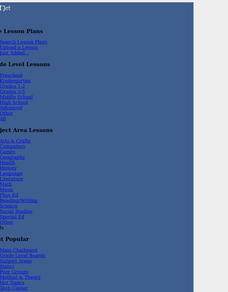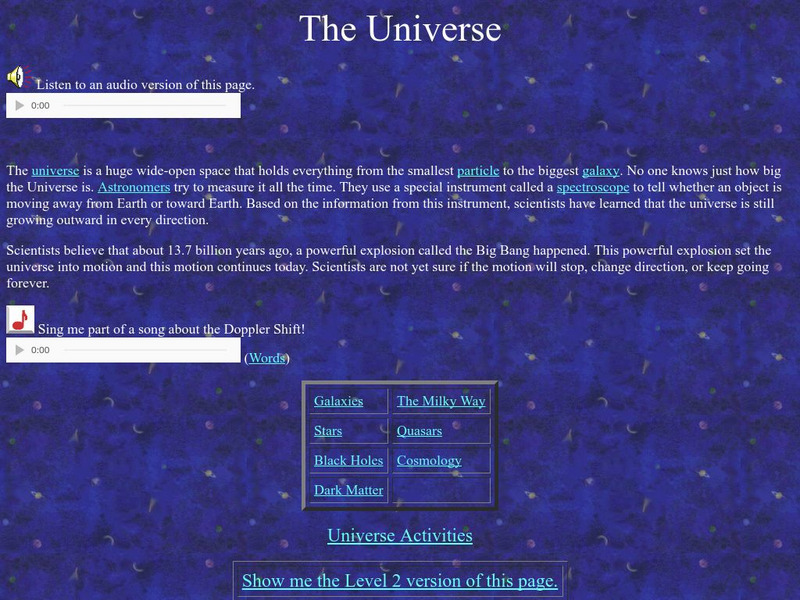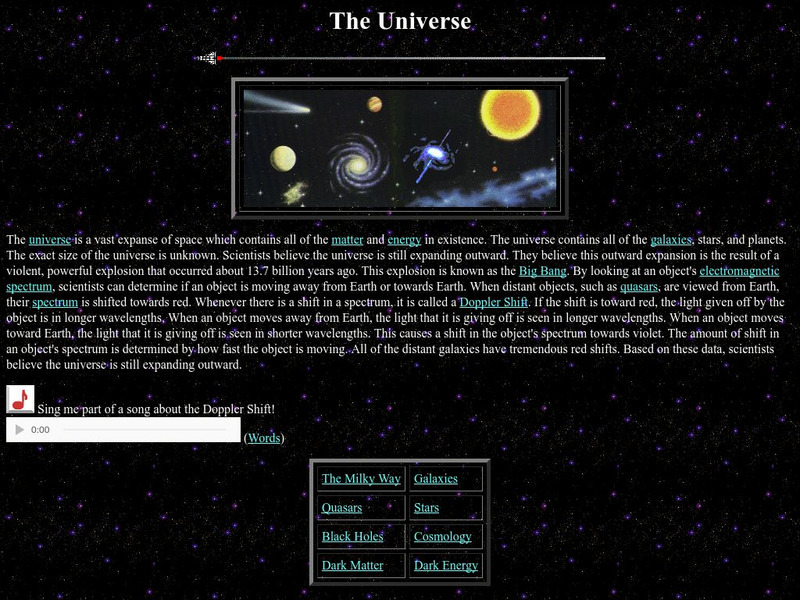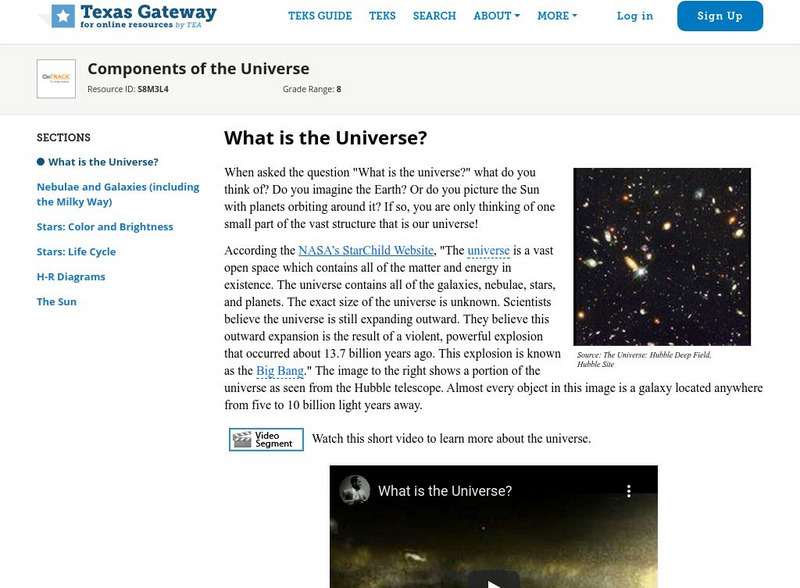Howard Hughes Medical Institute
Distribution of Elements in Earth’s Crust
How do scientists know the difference between a meteorite from space and a regular rock from the earth? Scholars read a passage and answer comprehension questions about the creation of the solar system. They extrapolate the main ideas to...
Curated OER
The Milky Way: A Mere Cloud in the Cosmos
In this galaxy worksheet, students calculate the volume of the Milky Way Galaxy, they determine the total mass, the density and the volume of the Milky Way Galaxy. They also solve 2 problems about the volume and size of the universe in...
Curated OER
The Universe
Middle schoolers describe what scientists mean by an "expanding universe" in their own words. They explain how scientists comprehend the universie is expanding. Students comprehend the vast scale of the universe. They comprehend how...
Curated OER
The Sun in Our Lives
Third graders identify the different parts of the sun. In this astronomy lesson plan, 3rd graders examine how the sun's energy drive life processes on Earth. They construct a model of a solar system using large rolls of toilet paper.
International Technology Education Association
Telescope as Time Machine
This resource provides an explanation of NASA's GALEX mission and how the space-based telescope can view distant galaxies as they were billions of years ago. The resource also discusses the other aspects of galaxies that GALEX...
NASA
A Glimpse of the Most Distant Galaxy
For this most distant galaxy activity, learners use a Deep Field image taken by the FORS camera at the ESA-VLT observatory to answer 4 questions about the redshifts identified in the field. They use an on line redshift calculator to...
Curated OER
The Energy of Empty Space
In this energy in empty space learning exercise, students use an equation for Cosmic Inflation to solve eight problems. They find the domain and range of the function of the equation, they determinethe axis of symmetry, they find the...
Curated OER
Time Intervals
In this time intervals worksheet, students solve 8 problems where they determine the time gamma-ray bursts last, the time black hole micro-flares are emitted, the time coronal mass ejections travel and the days between lunar phases of...
Curated OER
Gravity Gets You Down
Students investigate the force of gravity and how it effects different objects that are put into acceleration when applied the experiment of free falling. They drop different objects that have a variety of masses and some that cause air...
Curated OER
Periodic Table of the Elements: Noble Gases
Students research how neon signs are made and design their own. In this periodic table lesson, students familiarize themselves with the noble gases on the periodic table. They watch a video, research how neon signs are made, and design...
Curated OER
U.S. Quiz Questions
In this ESL United States learning exercise, middle schoolers answer a set of 25 questions about the United States. The answers to each question are written beneath each.
Curated OER
The Vocabulary of Space
Students build their knowledge and understanding of vocabulary related to space. In this space lesson, students discuss four categories of words and phrases related to space.
Curated OER
Figurative Language Scavenger Hunt
Eighth graders analyze and interpret figurative language. They listen to some examples of poetry which use figurative language. Then, they divide into groups and attempt to find more examples. Finally, 8th graders write what the poet is...
NASA
Nasa: Space Place: What Is the Big Bang?
With exciting illustrations, NASA's Space Place explains the theory of the origin of the universe known as the Big Bang.
NASA
Nasa Star Child: The Universe (Level 1)
This site provides an introduction to the origin of the universe for the young child and the Big Bang theory. There is also a song about the Doppler Shift. Vocabulary glossary and printable version available.
Utah Education Network
Uen: Where Did the Matter in the Universe Come From?
Students use various articles about how atoms are made and spread throughout the universe starting with the Big Bang. They will study the articles as groups and will then present their information to the class.
PBS
Pbs Teachers: Life's Big Questions: How Did the Universe Begin?
Investigate the Big Bang Theory of the origin of the universe by researching the light spectrum and the actions of light waves. Create models that illustrate red shift in a moving star and the expansion of the universe.
Australian Museum
Australian Museum: The Earth: The Universe
Basic information about the universe, its origin and composition. Also includes information about galaxies, stars, and the sun.
Utah State Office of Education
Utah State Office of Education: How Did the Universe and Solar System Develop?
Explore this unit to learn how the universe began. Through illustrations, videos, and classroom activities, gain an understanding of how stars help with the formation of elements.
NASA
Nasa Star Child: The Universe (Level 2)
This site provides a description of the universe and what it contains. Includes links to definitions, activities, and an audio song. Printable version available.
Texas Education Agency
Texas Gateway: What Is the Universe?
The following tutorial is an explanation of what the universe is composed of.
NASA
Nasa: Image Science Center: Ask the Space Scientist
A NASA scientist, Dr. Sten Odenwald, answers many students' questions. Topics include planets, galaxies, black holes, the origin of the universe, and common misconceptions about space.
TED Talks
Ted: Ted Ed: What Is the Universe Made Of?
The atoms around you have existed for billions of years- and most originated in the flaming, gaseous core of a star. Dennis Wildfogel tells the captivating tale of these atoms' long journeys from the Big Bang to the molecules they form...
Smithsonian Institution
Smithsonian Learning Lab: The Universe, an Introduction
Start with the questions all students ask: How big is the universe, how far away are the planets and stars, how did they form and when, how do they move and why? Build on their natural curiosity. The Smithsonian, in cooperation with...























